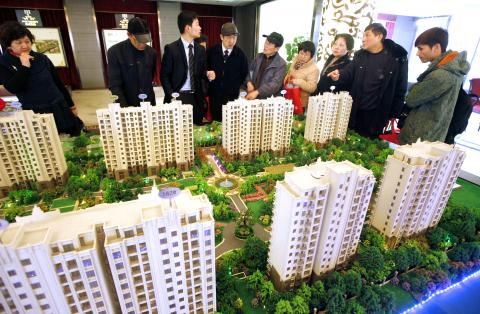China’s new house prices posted the broadest advance since December 2011, a test for new Chinese Premier Li Keqiang (李克強) as he seeks to prevent a bubble without damping economic growth.
Prices climbed in 62 cities of the 70 the government tracks last month from a year earlier, China’s National Bureau of Statistics said yesterday.
Beijing prices jumped 5.9 percent from a year earlier, the biggest since February 2011, while they advanced 8.1 percent in Guangzhou, the most since January 2011.

Photo: Reuters
China on March 1 imposed its toughest curbs in a year, ordering the central bank to raise down-payment requirements and interest rates for second mortgages in cities with excessive price gains, enforcing a property sales tax and telling local governments with the biggest price pressures to tighten property purchase limits.
It ordered individuals selling properties to pay a 20 percent tax on the sale profit when the original purchase price is available, a levy that is being easily avoided.
“We are expecting more property policies in the next couple of months including those issued by local governments, because fast-rising house prices have put the government under a lot of pressure,” said Ding Shuang (丁爽), a senior China economist with Citigroup Inc in Hong Kong. “It’s not only a big challenge for the new administration, but also shows that previous curbs have not worked.”
The Shanghai Stock Exchange Property Index, which tracks 24 developers, declined 1.4 percent to the lowest since Dec. 7 last year at the close of trading.
The southern cities of Guangzhou and Shenzhen were among major cities that led gains last month from a year earlier.
Prices in Shenzhen advanced 5.7 percent. The special economic zone that borders Hong Kong said last week it is taking steps to guide developers in setting reasonable prices and is implementing the central government’s measures to ensure prices do not rise too quickly.
The biggest decline in new house prices last month was in Wenzhou, where they tumbled 10.1 percent from a year earlier.
Existing house prices rose 6 percent in Beijing last month from 12 months ago and increased 3.9 percent in Shanghai, according to the data. They climbed 5.7 percent in Guangzhou and 3.9 percent in Shenzhen.
Former Chinese premier Wen Jiabao (溫家寶), who was succeeded by Li on Friday, had vowed to keep housing affordable and taken multiple measures.
During his tenure, Wen raised down-payment and mortgage requirements, imposed a property tax for the first time in Shanghai and Chongqing, and enacted home-purchase restrictions in about 40 cities.
Local governments must respond to the central government’s March 1 policies, including price control targets, by the end of the month.
Private data also has shown increases in prices. House prices rose for nine straight months, increasing 0.8 percent last month, according to SouFun Holdings Ltd (搜房控股), the country’s biggest real estate Web site owner.
China’s property prices will “definitely” decline this year, Shanghai Securities News reported on Thursday, citing Chinese Housing Minister Jiang Weixin (姜偉新).

In Italy’s storied gold-making hubs, jewelers are reworking their designs to trim gold content as they race to blunt the effect of record prices and appeal to shoppers watching their budgets. Gold prices hit a record high on Thursday, surging near US$5,600 an ounce, more than double a year ago as geopolitical concerns and jitters over trade pushed investors toward the safe-haven asset. The rally is putting undue pressure on small artisans as they face mounting demands from customers, including international brands, to produce cheaper items, from signature pieces to wedding rings, according to interviews with four independent jewelers in Italy’s main

Japanese Prime Minister Sanae Takaichi has talked up the benefits of a weaker yen in a campaign speech, adopting a tone at odds with her finance ministry, which has refused to rule out any options to counter excessive foreign exchange volatility. Takaichi later softened her stance, saying she did not have a preference for the yen’s direction. “People say the weak yen is bad right now, but for export industries, it’s a major opportunity,” Takaichi said on Saturday at a rally for Liberal Democratic Party candidate Daishiro Yamagiwa in Kanagawa Prefecture ahead of a snap election on Sunday. “Whether it’s selling food or

CONCERNS: Tech companies investing in AI businesses that purchase their products have raised questions among investors that they are artificially propping up demand Nvidia Corp chief executive officer Jensen Huang (黃仁勳) on Saturday said that the company would be participating in OpenAI’s latest funding round, describing it as potentially “the largest investment we’ve ever made.” “We will invest a great deal of money,” Huang told reporters while visiting Taipei. “I believe in OpenAI. The work that they do is incredible. They’re one of the most consequential companies of our time.” Huang did not say exactly how much Nvidia might contribute, but described the investment as “huge.” “Let Sam announce how much he’s going to raise — it’s for him to decide,” Huang said, referring to OpenAI

Nvidia Corp’s negotiations to invest as much as US$100 billion in OpenAI have broken down, the Wall Street Journal (WSJ) reported, exposing a potential rift between two of the most powerful companies in the artificial intelligence (AI) industry. The discussions stalled after some inside Nvidia expressed concerns about the transaction, the WSJ reported, citing unidentified people familiar with the deliberations. OpenAI makes the popular chatbot ChatGPT, while Nvidia dominates the market for AI processors that help develop such software. The companies announced the agreement in September last year, saying at the time that they had signed a letter of intent for a strategic